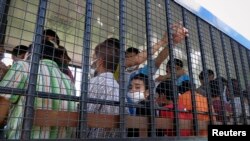The U.S. Agency for International Development is working with international partners to support and rebuild religious minority communities in Northern Iraq and elsewhere around the globe, said USAID Deputy Administrator Bonnie Glick at a recent conference in Hungary.
In Qaraqosh, in the Nineveh Plain, Iraqi Chaldeans are rebuilding after years of ISIS control. USAID is partnering with the Assyrian Aid Society to rehabilitate 100 locally-owned shops and to help restore the St. George Commercial Center. As a result, many of the 50,000 people who had fled the area are now returning to reestablish their roots. Such collaboration among different religious and ethnic organizations inspires hope in a world where religious intolerance and persecution seems to be on a relentless forward march, said Deputy Administrator Glick.
In China, more than a million Uighurs and other religious and ethnic minorities have been forced into internment camps for so-called “re-education.” Recent detainees recount harrowing tales of medical experimentation on prisoners and repression of even the smallest observance of the Islamic faith, said Ms. Glick. “The Chinese government has done its best to distract attention from its activities in the Xinjiang region.”
Meanwhile, the Burmese military bears responsibility for human rights abuses across Burma, including horrific atrocities committed against Rohingya in northern Rakhine State. Rohingya have been denied basic rights and continue to live in internally displaced persons camps inside Burma and in refugee camps across the border in Bangladesh. The United States is the largest donor to the humanitarian response to the Rohingya crisis, providing more than $669 million since August 2017.
In addition, the Departments of Treasury and State announced publicly December 10 the imposition of financial sanctions on four top current and former Burmese military leaders for their role in serious human rights abuses. The United States remains committed to partnering with the people of Burma in support of their democratic reform, national reconciliation, and economic transformation efforts.
In a world, where 80 percent of the world’s population lives in countries where religious liberty is threatened, restricted, or banned, “we cannot afford to remain silent” said Deputy Administrator Glick. We must speak out, and “we must be eternally vigilant.”














